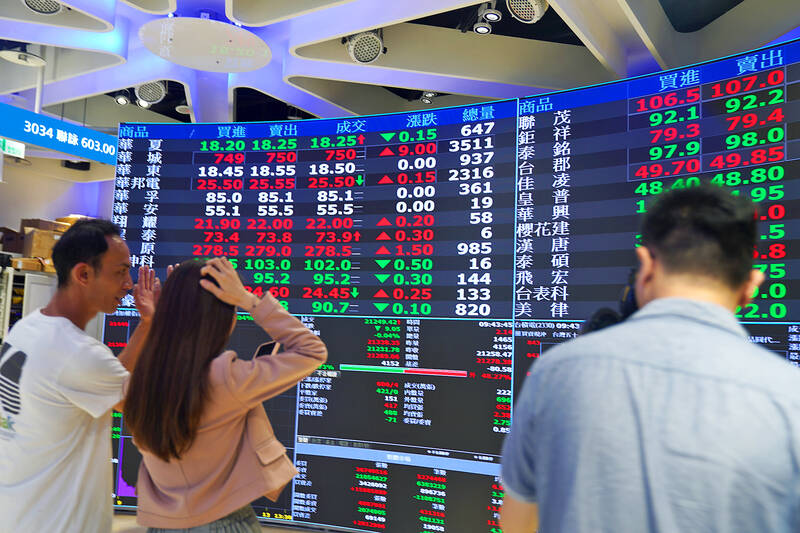The public’s confidence in the economic outlook and stock investment declined slightly this month, but remained positive overall, a survey by Cathay Financial Holding Co (國泰金控) showed yesterday.
Of the respondents, 34.2 percent expect the nation’s economy to improve in the next six months, while 32.1 percent are anticipating negative twists and 29 percent believe things would remain steady, the survey said after polling 16,543 customers online between May 1 and May 7.
That was a small retreat from last month, but stayed in optimistic territory, in line with the government’s business climate monitor system flashing “green,” which indicated steady economic growth, the conglomerate said.

Photo: CNA
The respondents are also upbeat about stock investment, although less optimistic compared with last month, after the TAIEX repeatedly hit record highs this month.
The survey also showed that 41.2 percent of respondents believe the TAIEX would climb higher moving forward, 26.8 percent anticipate corrections, 19 percent expect no changes and 13 percent said they do not know.
The local bourse has received fund inflows from foreign institutional players and mutual funds featuring quarterly or monthly distributions of cash dividends.
Taiwan’s exchange-traded fund market increased to NT$2.05 trillion (US$63.59 billion) as of Tuesday last week, posting an average 13.41 percent return for 60 funds this year, government data showed. The volume suggested a 40 percent spike from NT$1.46 trillion at the end of last year.
The impressive showings came at the cost of savings, such as insurance policies, which Taiwanese use to protect against retirement and old age.
Of the respondents, 34.4 percent said they would raise stakes in stock holdings, 14.9 percent intended to cut positions and 50.7 percent said they would maintain the status quo, the survey found.
Most people, 65 percent, said their income would stay the same in the coming six months, while 22.8 percent are looking at wealth gains and 12.2 percent at wealth erosions, the survey said.
When it comes to employment, 30.4 percent believe the job market would become more difficult going forward, compared with 19.8 percent who think finding jobs would become easier while 42.4 percent had neutral views, it added.
Despite the backdrop, 33.2 percent showed interest in purchasing big-ticket items, 21.7 percent said they would lower their budget and a relative majority, 45.1 percent, would not change their spending, it found.
Furthermore, a relative majority of 42.8 percent said that the need to declare personal income this month would not affect their funds or share holdings, the survey said.

TARIFFS: The global ‘panic atmosphere remains strong,’ and foreign investors have continued to sell their holdings since the start of the year, the Ministry of Finance said The government yesterday authorized the activation of its NT$500 billion (US$15.15 billion) National Stabilization Fund (NSF) to prop up the local stock market after two days of sharp falls in reaction to US President Donald Trump’s new import tariffs. The Ministry of Finance said in a statement after the market close that the steering committee of the fund had been given the go-ahead to intervene in the market to bolster Taiwanese shares in a time of crisis. The fund has been authorized to use its assets “to carry out market stabilization tasks as appropriate to maintain the stability of Taiwan’s

STEEP DECLINE: Yesterday’s drop was the third-steepest in its history, the steepest being Monday’s drop in the wake of the tariff announcement on Wednesday last week Taiwanese stocks continued their heavy sell-off yesterday, as concerns over US tariffs and unwinding of leveraged bets weighed on the market. The benchmark TAIEX plunged 1,068.19 points, or 5.79 percent, to 17,391.76, notching the biggest drop among Asian peers as it hit a 15-month low. The decline came even after the government on late Tuesday authorized the NT$500 billion (US$15.2 billion) National Stabilization Fund (國安基金) to step in to buoy the market amid investors’ worries over tariffs imposed by US President Donald Trump. Yesterday’s decline was the third-steepest in its history, trailing only the declines of 2,065.87 points on Monday and

TARIFF CONCERNS: The chipmaker cited global uncertainty from US tariffs and a weakening economic outlook, but said its Singapore expansion remains on track Vanguard International Semiconductor Corp (世界先進), a foundry service provider specializing in producing power management and display driver chips, yesterday withdrew its full-year revenue projection of moderate growth for this year, as escalating US tariff tensions raised uncertainty and concern about a potential economic recession. The Hsinchu-based chipmaker in February said revenues this year would grow mildly from last year based on improving supply chain inventory levels and market demand. At the time, it also anticipated gradual quarter revenue growth. However, the US’ sweeping tariff policy has upended the industry’s supply chains and weakened economic prospects for the world economy, it said. “Now

An employment discrimination lawsuit against contract chipmaker Taiwan Semiconductor Manufacturing Co (TSMC, 台積電) might soon be expanded after a hearing in a federal court in San Jose, California, on Tuesday to add 15 plaintiffs to the case. According to a court document, the lawsuit, which was refiled in November last year as a form of a class action with 13 plaintiffs in California, wants to add 15 plaintiffs from Arizona, where TSMC is building up its wafer fab capacity. TSMC first committed between 2020 and last year to invest US$65 billion in three advanced wafer fabs in Arizona. It then pledged an